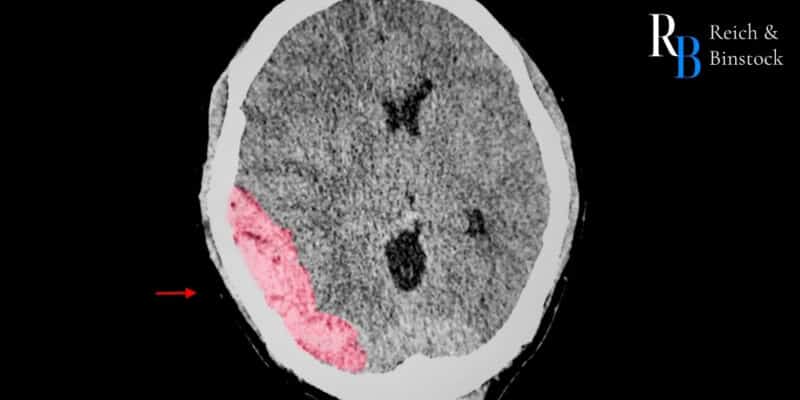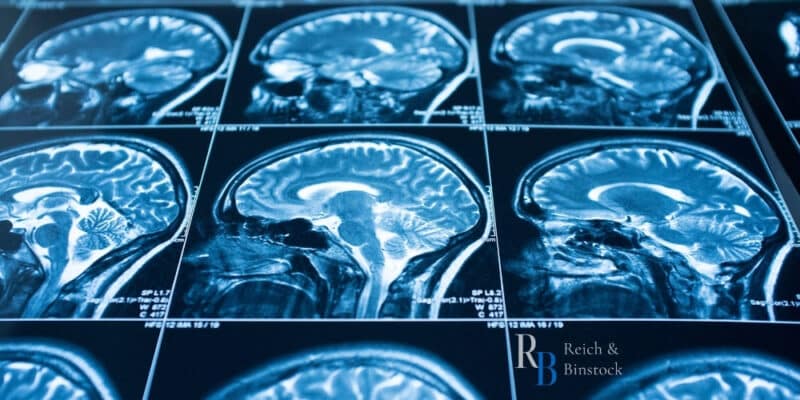HOUSTON TRAUMATIC BRAIN INJURY LAWYER
PRACTICE AREAS
Traumatic Brain Injury Lawyer in Houston, Texas

Table of Contents
A traumatic brain injury has the potential to leave victims with life-altering consequences. Sometimes, people end up with lifelong disabilities that lead to struggles with memory, movement, speech and so much more. In more severe cases, it even leads to death. Victims of traumatic brain injury, no matter the cause, deserve qualified representation for their case.
At Reich & Binstock of Houston, we handle all manner of personal injury cases, including those involving traumatic brain injuries. Understanding the severity of these cases is crucial for any TBI lawyer. We work with our clients right from the start until the resolution of their case. If you or a loved one suffered a traumatic brain injury from a car accident or other cause, the attorneys at Reich & Binstock are here for you. To schedule your free consultation with a Houston brain injury attorney, give our office a call at 713-622-7271 today.
What is a Traumatic Brain Injury?
A severe head or body hit or jolt is typically responsible for traumatic brain injury. An item passing through the brain tissue can also cause traumatic brain damage, like a gunshot or a broken piece of skull. Mild brain injury damage may momentarily alter your brain cells. More significant traumatic brain damage can include tearing, bruising, bleeding, and other damage to the brain. These injuries might lead to long-term complications or even wrongful death.
Unfortunately, TBI is a major source of disability and death. In fact, approximately 64,000 deaths related to TBI occurred in the U.S. in 2020. Brain injuries can happen to anyone. Certain groups of people, however, are at a greater risk of death or long-term health problems from TBI than others.
Increased Risk of Brain Injury
Some groups of people are more likely to develop brain injuries or have lasting symptoms after an injury. This includes:
- Ethnic and racial minorities
- Veterans and active service members
- Those experiencing homelessness
- Those in correctional and detention facilities
- Domestic violence survivors
- Those living in rural areas
Risk factors for brain injuries often mean that these people have a greater risk of injury after head trauma. After any kind of blow to the head, you should seek medical treatment as soon as possible. If your injury was caused by another person’s negligence, an experienced personal injury lawyer can help you recover compensation for your injury.
Common Symptoms of a Traumatic Brain Injury
Symptoms depend almost entirely on the severity of the injury itself. These injuries have the potential to be mild, moderate, or severe. Medical professionals call a mild TBI a “concussion.” Generally, it either does not cause unconsciousness or the unconsciousness only lasts 30 minutes or less. Other symptoms include the following.
- An inability to remember how the injury happened, or any events up to 24 hours after the injury occurred.
- Disorientation or confusion
- Complications with remembering new information
- Headaches
- Dizziness
- Blurry vision
- Vomiting or nausea
- Ringing in the ears
- Difficulty speaking coherently
- Changes in sleeping patterns or emotions
These symptoms usually occur immediately or shortly after the injury, but may not even manifest for days or weeks. In the course of hours, days, or weeks, mild traumatic brain injury symptoms can come and go. In other cases, these symptoms may last months or more.
Moderate brain injuries tend to produce unconsciousness that lasts anywhere from 30 minutes to 24 hours. Severe injuries have the potential to lead to more than 24 hours of unconsciousness. The symptoms for moderate and severe injuries mirror those for mild injuries, but they usually last longer or present in a more serious way.
The most common symptoms are changes in brain cognition, which sometimes produce disabilities or long-lasting symptoms. Also, the brain’s ability to learn and remember new information suffers from TBIs. Even years after the injury occurs, some people experience highly severe changes in their thinking skills.
Levels of Brain Injuries
With an organ as complex as the brain, it can be difficult to determine the level of damage without sophisticated medical equipment. Doctors often classify brain injuries as mild, moderate, or severe. These classifications determine the best treatment options and prognosis for the patient. This also helps healthcare providers determine the best plan moving forward with your care.
Mild TBI
Don’t let the term ‘mild’ fool you into a false sense of security. Even mild brain damage can have a significant impact on your life. Mild TBIs are often called concussions. In these cases, it’s not uncommon for a victim to lose consciousness for a short period of time. Confusion and dizziness can also appear without a loss of consciousness. The treatment for this type of injury often involves rest and avoiding screens for a few days.
Moderate TBI
Most traumatic brain injury cases result in a moderate classification. Some people with a moderate TBI can make a full recovery after rehabilitation, but some people have life-long impacts from the injury. These injuries are usually marked by a loss of consciousness and psychological symptoms that last for months. The prognosis of moderate brain injuries is dependent on other factors in the case.
Severe TBI
Most severe brain injuries are caused by a penetrating injury or a crush injury. Brain tissue is delicate, and this kind of injury can damage the tissue beyond repair. Most people with a severe TBI never make a full recovery and often have a lengthy hospital stay.
Types of Traumatic Brain Injuries
The brain is a delicate organ that can be injured in a variety of ways. Below, we’ve outlined some of the most common brain injuries. A TBI can change your life, but working with an experienced traumatic brain injury lawyer from Reich & Binstock can help you get back to the life you want to live.
Concussions
A concussion may be a mild brain injury, but it can still have lasting consequences. Most concussions are caused by a blow to the head, either from an object or from the head hitting a solid surface. The treatment for a concussion often involves lots of rest. Your doctor may recommend avoiding thinking activities for a little while, including reading or looking at screens.
Post-Concussion Syndrome
Post-concussion syndrome happens when the symptoms of a concussion don’t go away. Concussions are one of the mildest head injuries, but recovery isn’t always as simple as rest and relaxation. Many people experience lasting symptoms like fatigue, sleep disorders, mood issues, balance problems, and dizziness.
Hematomas
A hematoma is a collection of blood outside the blood vessels. A subdural hematoma is a collection of blood between the brain and the skull. This can put intense pressure on the brain, causing issues like headaches, vision problems, and confusion. Blood clots in the brain can cause oxygen deprivation in parts of the brain. This is known as a stroke, which often results in speech impairment and paralysis on one side of the body.
Diffuse Axonal Injuries
Unlike other forms of traumatic brain injuries, a diffuse axonal injury isn’t the result of a blow. Instead, this type of injury is from the brain moving violently inside the skull. The parts of the brain that communicate with neurons are called ‘axons.’ When violent movement causes the brain to move, these axons are disrupted and torn. A diffuse axonal injury is one of the leading causes of death in people with a traumatic brain injury.
Brain Contusions
A contusion is the medical term for a bruise. This sounds like a mild injury. Everyone gets bruises all the time, right? Unfortunately, contusions are serious injuries when it comes to the brain. Brain contusions can cause swelling in the brain, which can reduce cognitive function until the swelling resolves. In severe cases, surgery is required to drain some of the excess fluid before permanent damage sets in. Brain contusions can present in three different ways: coup injuries, contrecoup injuries, and coup-contrecoup injuries.
Coup Injuries
This type of contusion happens directly under the point of impact. “Coup” is another word for “blow.” This injury is localized and often doesn’t spread past the point of impact.
Contrecoup Injuries
Contrecoup injuries happen on the opposite side of the impact. Your brain is not totally solid; it’s a little bit like jelly. When a solid surface comes into contact with your head at high speed, the force can push your brain against the other side of the skull and cause a contusion. These types of injuries are often overlooked because they’re on the opposite side of the head from the point of impact.
Coup-contrecoup Injuries
A coup-contrecoup brain injury happens on both sides of the head. This type of injury usually comes from your head hitting a stationary object. Take a whiplash injury, for example. If someone rear-ends you, your head may hit your steering wheel or windshield and bounce back. The sudden back-and-forth motion can damage two different areas of your brain.
Penetrating Brain Injury
A penetrating brain injury is caused by something breaking through the skull into the brain. Bullets, knives, shrapnel, and other debris can break through the hard shell of the skull and damage the brain. These are considered open brain injuries, as opposed to closed brain injuries where the skull remains intact.
How Is a Brain Injury Diagnosed?
Traumatic brain injuries are potentially life-threatening. Seeking immediate medical attention after any kind of head injury is a must. Doctors or first responders need to examine the situation as soon as possible. By assessing a person’s ability to follow commands and move their eyes and limbs, the Glasgow Coma Scale assists a doctor or other emergency medical workers in determining the early severity of a brain injury. Speech coherence might also provide crucial information. The Glasgow Coma Scale rates abilities on a scale of three to fifteen. Higher ratings indicate less serious injuries. Doctors also use certain imaging tests to aid in their diagnosis as well, like CT scans and MRIs.
CT (computed tomography) scan: In the event of a suspected traumatic brain injury, this is generally the first test done in the emergency room. A CT scan creates a comprehensive image of the brain by using a sequence of X-rays. A CT scan can immediately reveal fractures as well as evidence of brain bleeding (hematomas), blood clots, damaged brain tissue (contusions), and swelling (edema).
MRI (magnetic resonance imaging): An MRI creates a comprehensive image of the brain by using strong radio waves and magnets. This test may be done when the person’s health has stabilized or if the symptoms have not improved within a few days of the accident.
What Causes a Traumatic Brain Injury?
The broad causes of traumatic brain injury involve severe blows to the head or body. TBI severity varies depending on several factors, including the force involved and the nature of the injury. Below, we list common events that result in traumatic brain injury.
Motor Vehicle Accidents
Car accidents, motorcycle accidents, and cycling accidents all play a role in traumatic brain injury. Pedestrians are also at risk of significant injuries.
Medical Malpractice
People go to a medical provider when they need help. Unfortunately, negligent healthcare providers can do more damage than healing. Poor intubation during surgery, failure to diagnose a brain bleed, and medication errors can all result in brain damage.
Birth Injuries
Failure to deliver a baby in time can result in oxygen deprivation, which can cause severe brain damage. Conditions like cerebral palsy and other birth injuries can result from negligent healthcare providers.
Workplace Injuries
Falling in a dangerous workspace can result in a severe brain injury. Falling items and machinery accidents can also result in a life-threatening occupational injury.
Falls
When people fall from ladders, down stairs, in the bath or shower, or in other ways, there is a risk for TBI. These falls are the most common sources of TBI injuries. Those most vulnerable include both elderly adults and young children.
Nursing Home Falls
Older people are at a significantly higher risk for falls than younger people. Fall deaths in people over 65 years old have increased more than 30% from 2007 to 2016. If your loved one is in a nursing home, keep an eye open for nursing home neglect and abuse. Nursing home fall injuries are serious and can take your loved one from you before their time.
Sporting Accidents
Soccer, boxing, football, baseball, lacrosse, skateboarding, hockey, and other high-impact sports pose a significant risk of TBIs. That’s why it is so important to wear protective gear.
Violence
Victims of gunshot wounds, child abuse, domestic violence, and other assaults sometimes suffer from traumatic brain injuries. Another TBI condition is “shaken baby syndrome,” which results from someone shaking an infant violently.
Combat Injuries
Blasts and explosions are common causes of traumatic brain injuries, especially in active-duty service members and Veterans. Additionally, penetrating wounds like those from shrapnel and debris cause these injuries.
Effects of Traumatic Brain Injuries
Brain function can be temporarily affected even after a mild head injury. Headaches, dizziness, tiredness, sadness, irritability, and memory issues all result from this. While most individuals recover from a mild head injury in two weeks or less, other people might have issues for months or even years. The longer the brain damage lasts, the more dramatic the long-term consequences will be. Survivors with more serious brain injuries are more likely to develop complicated long-term issues that impair their personality, relationships, and capacity to live independently.
Short-Term Effects
After a traumatic brain injury occurs, it’s important to seek medical attention right away. Even if the injury is ‘mild,’ it can have lasting effects on your life. Many people with a brain injury often experience issues with memory, balance, mood regulation, dizziness, and fatigue. In many cases, these symptoms go away as the brain heals. Unfortunately, some of these symptoms can stick around and have lasting consequences.
Physical Effects
Severe traumatic brain injuries can result in a loss of motor function in different parts of the body. Balance problems, weakness, and fatigue are all lasting effects of a brain injury. Brain injuries can make it difficult to perform activities of daily living, or ADLs. This includes eating, getting dressed, driving, and other aspects of daily life for normal adults.
Psychological Effects
Your brain controls everything that makes you you. Memory, emotional regulation, and mood changes are all aspects of your personality that create the you that people know and love. When a traumatic brain injury causes lasting psychological symptoms, you are not the only one that suffers. Many families of people with traumatic brain injuries report that their family member is just not the same after an accident. A traumatic brain injury can even increase the risk of developing mental health conditions like depression and anxiety.
How an Experienced Brain Injury Lawyer Can Help Your Case
It can be extremely difficult to recover compensation for a traumatic brain injury claim without the help of an experienced attorney. Brain injury victims should be focused on recovering from their injury, not fighting with insurance adjusters and running around to gather evidence. Let us handle the heavy lifting while you focus on healing. Our knowledgeable attorneys can focus on finding the liable parties and making them pay.
Evaluating Liability and Proving Negligence
After an accident, it can be hard to determine who is truly at fault for any injuries or damages. In cases of a big rig accident or commercial vehicle accident, the fault can be with multiple parties. As part of our thorough investigation process, we explore all possible liable parties and determine the level of negligence in each case. You can trust that our experienced attorneys will find the liable party and hold them accountable for their negligence.
Proving a Brain Injury
In many cases, brain injuries simply aren’t visible to the naked eye. Serious head injuries can leave someone with a permanent deformity or visible physical losses, but most brain injuries aren’t immediately noticeable. Your friends and family will likely be the ones who notice the changes to your personality, mood, or cognitive abilities more than anyone else. Proving a brain injury can be an overwhelming hurdle for many victims. You are often expected to go into detail about how this injury has changed your life and provide medical records documenting your recovery. Insurance companies and their lawyers will often try to downplay your injury to prevent paying you what you deserve. At Reich & Binstock, our attorneys work closely with medical experts who can provide expert testimony in your case.
Negotiating with Insurance Companies
It’s important to remember that insurance companies are in the business of making money. They often don’t care about what you’ve lost or the pain you and your family are going through. They will often do whatever it takes to disprove your claim and offer you the lowest possible settlement. A skilled traumatic brain injury attorney at Reich & Binstock can prevent insurance companies from taking advantage of you during this vulnerable time. Let us handle all communication from the insurance company. We can negotiate their lowball settlements and get you the compensation you need to recover from your injuries. If they refuse to offer you what you deserve, we have the knowledge and resources to fight them in court.
Compensation in a Brain Injury Case
Compensation in a traumatic brain injury lawsuit can be difficult to put a number on. At Reich & Binstock, our experienced attorneys will determine the extent of your injuries and help you put a dollar amount on what you’ve lost. Without an extensive investigation, insurance companies will try to downplay your injury and offer you a bare-bones settlement. This is unacceptable. When someone else’s negligence causes an injury, they should be held responsible for the damages. Our brain injury lawyers fight for everything you deserve, including:
- Lost wages
- Lost future income potential
- Medical expenses
- Home and car renovations
- Property damage
- Pain and suffering
- Mental anguish
- Loss of enjoyment in life
- Punitive damages
- Funeral and burial expenses
- Wrongful death
Traumatic brain injuries can take away motor functions, cognitive abilities, and so much more. At Reich & Binstock, our attorneys fight to recover the compensation you deserve after someone’s negligence causes your injury.
Workers Compensation and TBIs
Trauma to the face or head from falling items, heavy machinery accidents, and slip and fall accidents are all major causes of workplace head injuries, which include damage to the eyes, face, and skull. Head injuries are among the most serious and life-threatening occupational injuries because of their closeness to the brain.
Immediately after reporting your accident to your employer, we recommend hiring a brain injury lawyer for your TBI Workers’ Compensation claim. While filing for benefits, an attorney will help you understand what injuries qualify for benefits, how to file a Workers’ Comp claim, and the amount of compensation you might receive. Work injury lawyers provide you with the necessary information and assistance needed to help your case proceed smoothly.
Reich & Binstock Can Help You Recover Maximum Compensation for Your Injury
A brain injury lawsuit can help you afford the resources you need to recover from a traumatic brain injury. These injuries often have devastating consequences and a long, expensive recovery. Severe cases that end in loss of motor function can mean that you need to modify your home or vehicle to continue living a normal life. At Reich & Binstock, we fight to recover the maximum compensation in your case. Our attorneys have recovered billions of dollars in damages to victims and their families. No fight is too big for us to handle. You can trust the experienced traumatic brain injury lawyers at Reich & Binstock with your case.
Experienced Houston Brain Injury Attorneys
Dealing with the aftermath of a TBI is an emotional experience. These injuries often affect one’s ability to monitor their own emotions. They also impact people’s ability to return to work and sometimes affect their personal relationships. Luckily, the traumatic brain injury attorneys at Reich & Binstock are here to help. We dedicate our legal practice to fighting on behalf of our clients and advocating for their future in the courtroom. If you need an attorney for your traumatic brain injury, look no further. To schedule your free consultation, please call our Houston office at 713-622-7271 today.
There is never a fee unless we recover on your behalf.




















